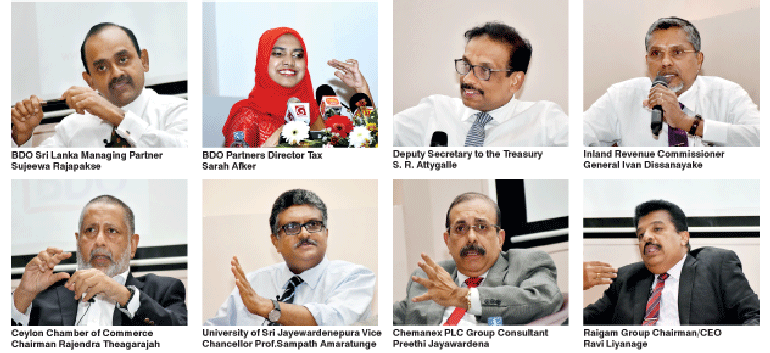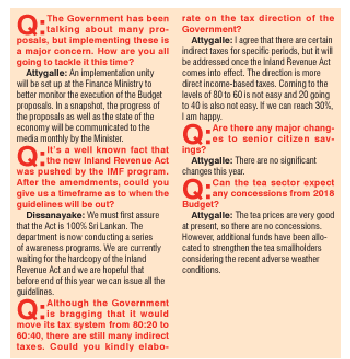Saturday Feb 21, 2026
Saturday Feb 21, 2026
Thursday, 23 November 2017 00:29 - - {{hitsCtrl.values.hits}}
By Charumini de Silva
BDO Partners Sri Lanka recently hosted its customary post-Budget forum for the benefit of its clients and other stakeholders, highlighting salient features of the 2018 Budget and legislative changes in 2017, while creating a platform for industry personalities to voice their opinions and concerns.
BDO Partners Managing Partner Sujeewa Rajapakse in his remarks welcomed the Blue-Green economy as a good move, but raised concerns in repaying the massive debts from next year onwards.
With Government’s Vision 2025 anticipating to increase foreign direct investments (FDIs) to $ 5 billion per year and double exports to $ 20 billion per year he pointed that it was critical to create a conducive environment for foreign investments.
“We as professionals find it difficult to convince foreign investors. We tried to set up one-stop-shop (OSS) for many years but it became a non-stop-shop when you go there to get a project approved. We must remember that there are other places investors look for such as Bangladesh, Vietnam and Cambodia who are our competitors,” Rajapakse added.
He also said that Sri Lanka slipping down the rankings of the Ease of Doing Business Index is a great concern that needs to be addressed immediately in attracting the much-needed FDIs to the economy.

BDO Partners Director Tax Services Sarah Afker made a presentation on the changes made to the revenue statutes.
Although the VAT refund scheme for foreign passport holders has been proposed in the 2017 Budget as well, she said it was not implemented. However in 2018 Budget the scheme seeks to provide VAT refund procedure to foreigners at the airports and seaports with the vision of making Sri Lanka a shopping hub with effect from 1 May next year.
Noting that liquor is the top loser in any Budget, she said many exemptions given to the industry will be removed from April 2018. Nevertheless, the liquor licenses will be simplified and new liquor licenses will be issued to promote tourism.
New levies
Cellular Tower Levy, Short Message Service (SMS) Advertising Levy, Debt Repayment Levy and Carbon Tax were outlined as four new taxes ad levies introduced. She asserted the rates per the Budget speech were inconsistent with the rates as per the technical notes, where this anomaly needs to be clarified.
Out of that she said the debt repayment levy had been the most debated topic in the social media currently. The debt repayment levy will be introduced for a period of three years on total transaction made through banks at the rate of 0.02%. This levy will include the repayment of international sovereign bonds as well.
“As per the technical note of the Budget proposal, the chargeability of this levy is on cash transactions by ‘financial institutions’ where as in the Budget speech it refers to ‘banks’. Therefore, it needs to be clarified whether the levy is applicable only to the banks or to all financial institutions. Also, clarity is required as to the time of payment,” she pointed out.
Afker highlighted that Cess has been removed on over 250 items to facilitate growth in certain sectors like tourism, value adding industries and other industries.
The presentation was followed by a panel discussion, where Afker was joined by Inland Revenue Department Commissioner General Ivan Dissanayake, Treasury Deputy Secretary S.R. Attygalle, University of Sri Jayewardenepura Vice Chancellor Prof. Sampath Amaratunge, Ceylon Chamber of Commerce Chairman Rajendra Theagarajah, Chemanex PLC Group Consultant Preethi Jayawardene, Raigam Group Chairman and CEO Dr.Ravi Liyanage. The panel discussion was moderated by BDO Partners Managing Partner Sujeewa Rajapakse.
Focus on SME sector
Attygalle said the basis of the Budget 2018 was to create an ‘Enterprise Sri Lanka’ focusing mainly on SME sector.
“Sri Lanka is a SME economy. We want to support push the SMEs up and drive the economy forward. The Government has taken many steps in this Budget to support the sector in many different ways, areas and industries,” he added.
He said the proposals are aligned to achieve these goals and that’s the direction of the Government.

Pointing out that the ocean around Sri Lanka is 26 times bigger than the island and was pretty much underutilised, he said the 2018 Budget proposals were to be used for the better usage of these resources and urged to believe in the economic vision outlined by the Government.
Dissanayake said revenue generation was critical as there were many loans to be repaid in the next three years which were obtained by the Government during the past 10 to 15 years.
“Within the next three years we have to pay Rs. 7000 billion as capital repayment. Next year itself we have to pay Rs. 1,972 million as capital repayment. From the local sources of incomes we can only generate Rs. 3 trillion and out of that Rs. 2 trillion we have to repay the loans,” he pointed out.
Consistency is key
Theagarajah said the CCC expected the Government to maintain consistency in its policies adding that there appeared to be a direction and resonation with the Prime Minister’s 2017 Economic Policy Statement as well as the Vision 2025.
“The CCC prompted an export-led economic growth, where diversification, engagement of the value chain across the whole spectrum of business and trade facilitation will benefit Sri Lanka, not just few large corporates,” he added.
He underscored lack of finance as a challenge to SME sector as most commercial banks tends to require collateral in providing a reasonable finance facility. However, he was optimistic about the proposal to setup a new export guarantee fund, which he believes would greatly support the SMEs that are into exports. He also welcomed the trade liberalisation with the removal of para tariffs.
Banking system
In terms of the financial industry, Theagarajah said Sri Lanka’s banking system currently in a transition period had to comply with IFRS and Basel III regulations from next year.
“We are shifting from time-based accounting to event-based accounting as far as balance sheet is concerned. I think the balance sheets can expect some significant shocks coming in as provisions from 2018,” he explained.
According to him there is an expectation that the bank balance sheets will have to be recapitalised from the current Rs. 10 billion to Rs. 20 billion by end of 2020. Further he said the new Basel III would have an additional focus on risk-based capital requirement.
“I only hope there has been good consultation with the banking regulator and the Monetary Board, so that it will balance the shocks of both sides,” he said.
 The freedom given to two State banks to list on the Stock Exchange was highly commended by Theagarajah, who said it would have a positive impact on liquidity as well as the share prices of the capital market.
The freedom given to two State banks to list on the Stock Exchange was highly commended by Theagarajah, who said it would have a positive impact on liquidity as well as the share prices of the capital market.
“These two banks have been given the freedom, if they wish to list on the Stock Exchange. It doesn’t mean privatisation; it’s about listing and opening to the public.”
According to him, Bank of Ceylon and People’s Banks jointly command about 40% to 50% of the industry. He said if these two State banks list, they would be subject to a different level of governance and accountability, which would have a good correlation in the liquidity and capital market share prices.
“If these two banks take up this invitation without losing control of ownership, it will be a fantastic opportunity for Sri Lanka,” he stated.
Higher education
Prof. Amaratunge welcomed the 2018 Budget proposals especially in terms of the higher education sector where the Government has given special focus on science, technology, medicine and engineering.
He said out of the six proposals they made, three had been addressed, adding that building of technology units in universities was a very positive move.
“Changing the mindset of the students is very challenging. For 13 years in school and three to four years in university, it is difficult to change the attitudes of the children to be make them employable graduates at once in this backdrop. But it is necessary,” he added.
Prof. Amaratunge stressed on areas including ICT and innovation education as key pillars in building knowledge based economy.
“Sri Lankans are not development-driven. Most of the professionals are looking at issues wearing different coloured glasses. It is critical to change this mindset if the country needs to leap forward,” he said.
Jayawardene noted that 65% of the economy is backed by the SME sector and access to a cheap source of funds has been very rightly addressed in the 2018 Budget proposals. Given the Government support, he was optimistic that the SMEs, start-ups and the entrepreneurs will have the capacity to drive export-led economic growth.
Populist measures vs. fiscal consolidation
However, he said the Finance Minister was sandwiched between devil and the deep blue sea. “The Minister on one side needs to come out of the populist measures while at the same time he needs to have fiscal consolidation. Sri Lanka is under rigorous conditions of the International Monetary Fund (IMF) program.”
He also pointed that if the Government tried to implement everything in one go, it would have negative impacts on the economy.
“We need to understand that the recent VAT amendments have set all prices to increase and inflation is also picking up. All these things are going to generate hardships for the people. We need to have fiscal consolidation, but if we don’t bring these in a gradual manner, then there is going to be a disaster. It will be like we are going to get the economy jump-started,” he stressed.
Jayawardene said Sri Lanka had $ 47 billion in external debt, which is accountable for 57% of Gross Domestic Product (GDP). The total debt burden has risen to 79.3% while 80% is the disaster level.
“All these are questionable in implementation and policy consistency. If we try to stick to tightening too hard, too fast, then there could be other repercussions,” he cautioned.
In terms of the financial sector he said banks would have a difficult period going forward with increased tax payment. “Today banks pay 45% taxes including Income Tax, Financial VAT and NBT, while on top of that there are certain exemptions being removed. Where will we end up? Will there be anything for dividends among shareholders?”
Entrepreneurs
Dr. Liyanage said his major argument was in creating the much-needed entrepreneurs for the country in going forward as many of the graduates were not willing to take up that extra risk of becoming entrepreneurs.
“We need more businessmen in the country from the university graduates. Unfortunately most of graduates are seeking public sector job opportunities, which is more secure,” he pointed out.
The panel discussion was followed by a question and answer session, which was well received by the audience with several queries being posed to the panellists.
Pix by Indraratne Balasuriya